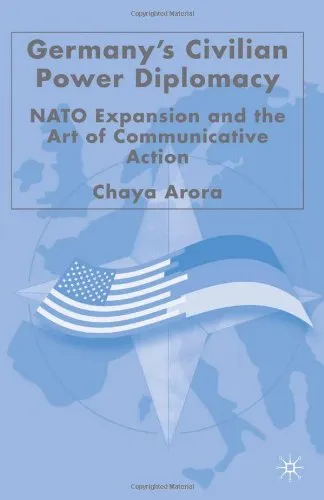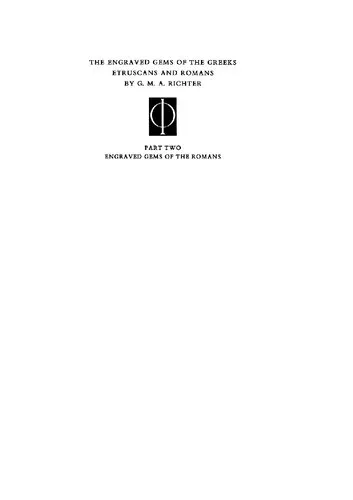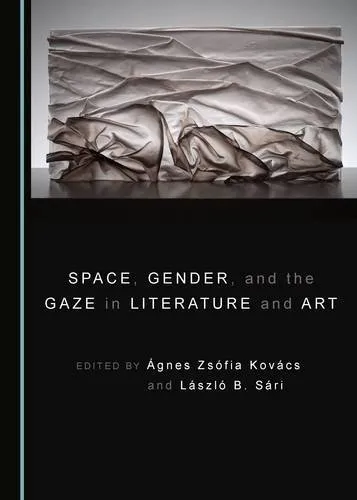Germany's Civilian Power Diplomacy: NATO Expansion and the Art of Communicative Action
4.2
بر اساس نظر کاربران

شما میتونید سوالاتتون در باره کتاب رو از هوش مصنوعیش بعد از ورود بپرسید
هر دانلود یا پرسش از هوش مصنوعی 2 امتیاز لازم دارد، برای بدست آوردن امتیاز رایگان، به صفحه ی راهنمای امتیازات سر بزنید و یک سری کار ارزشمند انجام بدینکتاب های مرتبط:
معرفی کتاب
کتاب "Germany's Civilian Power Diplomacy: NATO Expansion and the Art of Communicative Action" به بررسی نقش آلمان به عنوان یک نیروی غیرنظامی در دیپلماسی بینالمللی و گسترش نقش آن در چهارچوب NATO میپردازد. این کتاب به تحلیل چگونگی استفاده آلمان از تعاملات ارتباطی و قدرت نرم برای پیشبرد اهداف سیاسی و اجتماعی خویش در میان کشورهای اروپایی و Atlantic Alliance میپردازد.
خلاصه دقیق کتاب
"Germany's Civilian Power Diplomacy" توضیح میدهد که چگونه آلمان به عنوان یک نیروی غیرنظامی، قدرت خود را در قالب تعاملات دیپلماتیک و روشهای ارتباطی قوی به کار میبرد. کتاب به تحلیل گسترش تدریجی NATO پس از جنگ سرد و دیدگاههای مختلف کشورهای عضو میپردازد و تمرکز ویژهای بر نقشی دارد که آلمان در این فرآیند بازی کرده است. در این کتاب، موضوعات مختلفی از جمله چگونگی استفاده آلمان از قدرت نرم، روابط اقتصادی و فرهنگی پیچیده و همچنین سیاستهای حمایتجویانه آن کشور بررسی شده است.
کتاب به ویژه بر تئوریهای Jürgen Habermas درباره “communicative action” تمرکز دارد و توضیح میدهد که چگونه این نظریهها میتوانند به عنوان ابزاری برای درک بهتر دیپلماسی آلمان و سیاستهای بینالمللی استفاده شوند. با استفاده از تحلیلهای جامع و نمونههای کاربردی، این کتاب نشان میدهد چگونه آلمان با استفاده از تعاملات مؤثر و ارتباطات هدفمند، توانسته است نفوذ خود را در سیستمهای بینالمللی افزایش دهد.
نکات کلیدی
- نقش آلمان به عنوان یک بازیگر اصلی در گسترش NATO بعد از جنگ سرد.
- تحلیل چگونگی بهکارگیری نظریههای “communicative action” در دیپلماسی.
- قدرت نرم آلمان و تأثیر آن بر سیاستهای خارجی و روابط بینالمللی.
- استفاده آلمان از ارتباطات بینالمللی به عنوان ابزاری جهت اتحاد اروپا و توسعه همگرایی بینالمللی.
نقلقولهای معروف کتاب
"در جهانی که قدرت نرم روز به روز مهمتر میشود، آلمان توانسته است با بهکارگیری دیپلماسی مبتنی بر ارتباطات استراتژیک، موقعیت خود را در میان کشورهای برتر تثبیت کند."
"نظریههای Habermas در مورد اقدام ارتباطی به ما اجازه میدهد تا ابعاد جدیدی از دیپلماسی و نقش آلمان در سیستم جهانی را کشف کنیم."
چرا این کتاب مهم است
این کتاب برای کسانی که به روابط بینالملل و سیاست خارجی علاقهمند هستند، ضروری است زیرا رویکرد جدیدی به بررسی دیپلماسی مدرن ارائه میدهد. اهمیت این کتاب به دلیل دقیق بودن آن در تحلیل گسترش NATO و ارائه دیدگاههای جدید در مورد چگونگی استفاده کشورها از قدرت نرم جهت تثبیت و تقویت موقعیت خود در سطح جهانی است. این کتاب به خوبی نشان میدهد که چگونه تئوریهای پیچیده ارتباطی میتوانند در فرآیند تصمیمگیری سیاسی و راهبردی تأثیر داشته باشند.
در نهایت، "Germany's Civilian Power Diplomacy" به عنوان منبعی ارزشمند برای پژوهشگران، دانشگاهیان و سیاستگذاران مطرح است که به دنبال درک عمیقتری از تعاملات دیپلماتیک و نقش فرهنگ و ارتباطات در سیاستهای بینالمللی هستند.
Introduction to 'Germany's Civilian Power Diplomacy: NATO Expansion and the Art of Communicative Action'
In the rapidly evolving geopolitical landscape of the late 20th and early 21st centuries, Germany emerged as a pivotal player, not merely as an economic powerhouse but as a frontrunner in employing civilian power diplomacy. 'Germany's Civilian Power Diplomacy: NATO Expansion and the Art of Communicative Action' delves into Germany's strategic use of soft power and diplomacy within the context of NATO's expansion. This book examines how Germany navigated the complexities of international relations, leveraging its communicative actions while cementing its role in shaping global peace and stability. Through the prism of communicative action theory, this work explores how dialogue and negotiation underpinned Germany's diplomatic ethos.
Detailed Summary of the Book
The book begins by setting the historical and political context of post-Cold War Europe, introducing readers to the concept of 'civilian power' in which Germany acts not just by wielding influence but through fostering multilateral partnerships and advocating for cooperative security arrangements. The narrative unfolds around NATO's expansion eastward, a process fraught with both opportunity and controversy.
The core of the book analyzes Germany's foreign policy strategies that emphasize dialogue, consensus-building, and integration, advocating for diplomacy over military prowess. It thoroughly explores Germany's role in NATO's decision-making process, emphasizing Germany’s efforts to include Eastern European nations in the alliance, thereby ensuring a more comprehensive European security architecture.
Throughout the book, the author presents a nuanced analysis of Germany's strategic objectives, focusing on its pursuit of stability and peace through adherence to ethical norms and international cooperation. The methodology and insights are grounded in the theoretical framework of Jürgen Habermas' communicative action, highlighting the interplay between discourse ethics and diplomatic interactions.
Key Takeaways
- Civilian Power Diplomacy: Understand how Germany's emphasis on communication and cooperation serves as a model for peaceful conflict resolution.
- NATO Expansion: Gain insight into the complexities and strategic imperatives driving NATO's enlargement and Germany’s central role in the process.
- Communicative Action Framework: Explore how Habermasian theory applies to real-world diplomacy, demonstrating the power of dialogue in international relations.
- Strategic Multilateralism: Discover the effectiveness of multilateral alliances in addressing global security challenges within Germany's diplomatic agenda.
Famous Quotes from the Book
"Germany's influence lies not in force, but in its boundless capacity to engage the world in dialogue and foster a shared vision of collective security."
"The art of communicative action, as applied to diplomacy, is about manifesting the common will for peace through persistent dialogue."
Why This Book Matters
This book is crucial for understanding the intricate balance of power, diplomacy, and ethics in modern international relations. It offers an in-depth look at Germany's unique approach to global diplomacy and its impact on NATO expansion, a topic of profound significance for policymakers, scholars, and anyone interested in the future of international peace and stability. By elucidating the principles behind Germany’s diplomatic actions, the book serves as a comprehensive guide to harnessing the power of peaceful dialogue in resolving international conflicts.
The book also contributes significantly to the academic discourse on civilian power by providing an empirical case study that illustrates the practical application of theoretical constructs in contemporary world politics. It remains relevant for its insights into the ongoing challenges and opportunities facing Europe and the global community within the sphere of international diplomacy.
دانلود رایگان مستقیم
شما میتونید سوالاتتون در باره کتاب رو از هوش مصنوعیش بعد از ورود بپرسید
دسترسی به کتابها از طریق پلتفرمهای قانونی و کتابخانههای عمومی نه تنها از حقوق نویسندگان و ناشران حمایت میکند، بلکه به پایداری فرهنگ کتابخوانی نیز کمک میرساند. پیش از دانلود، لحظهای به بررسی این گزینهها فکر کنید.
این کتاب رو در پلتفرم های دیگه ببینید
WorldCat به شما کمک میکنه تا کتاب ها رو در کتابخانه های سراسر دنیا پیدا کنید
امتیازها، نظرات تخصصی و صحبت ها درباره کتاب را در Goodreads ببینید
کتابهای کمیاب یا دست دوم را در AbeBooks پیدا کنید و بخرید
1410
بازدید4.2
امتیاز0
نظر98%
رضایتنظرات:
4.2
بر اساس 0 نظر کاربران
Questions & Answers
Ask questions about this book or help others by answering
No questions yet. Be the first to ask!














